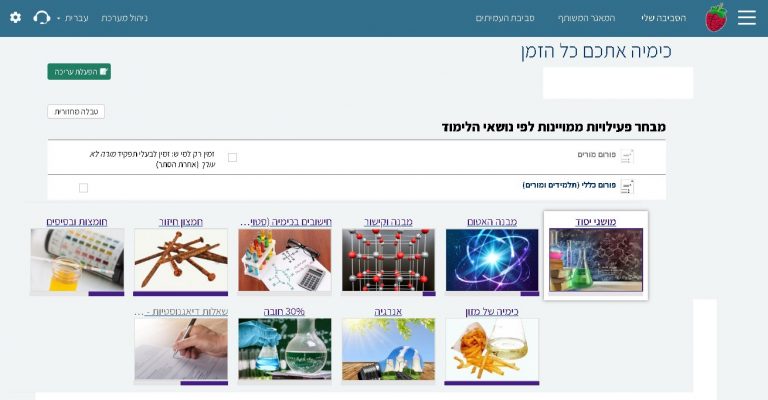The PeTeL Chemistry Environment During
the Covid-19 Pandemic
During the days in which the schools were closed, in order to help with chemistry teaching, we opened a course in the PeTeL environment (PeTel – Personalized Teaching and Learning Center) called Chemistry – With You All the Time. The course allows the chemistry students to experience various activities according to the chemistry curriculum. The activities were chosen in a way that enables the students to received immediate automatic feedback for them.
Approximately 200 chemistry teachers registered and received the opportunity to register their students to this course and track their activity in the course. At this stage PeTeL chemistry includes about 1700 students. The teachers enter their students into the study groups and receive intensive support from us via email for the purpose of registering and monitoring the students. In addition, we hold a few synchronous ZOOM sessions, some through the chemistry teacher communities, in order to help teachers who are still experiencing difficulties with the registering processes and operating in the environment.
The unique feature of PeTeL is that it enables the teachers to track the students' progress from a distance, see where they are having difficulties and suggest activities that are suitable for their class. This is in contrast to the materials provided by the Ministry of Education through television studios, in which the teacher has no ability to see their students' performance and the students cannot receive feedback for their actions.

About PeTeL Chemistry
PeTeL Chemistry is an environment designed for studying chemistry. The environment was developed with the purpose of making chemistry teaching tools, in the approach of personalized teaching and learning, accessible to teachers, and at the same time emphasizing the students' group work, which characterizes chemistry studies, focusing on the lab and alternative assessment unit (30%).
As part of the Chemistry Group in the Department of Science Teaching at the Weizmann Institute of Science, unique databases of diagnostic questions and tasks for the purpose of evaluating the status of the student's knowledge have been developed. As well as suggestions for teaching sequences that are designed in accordance with the gathered information. Personalized teaching is created by using interactive databases of diagnostic questions for the evaluation of the student's status, and by suggestions for teaching sequences that are designed in accordance with the gathered information.
The study materials in the environment are based on two main sources: existing materials that were developed by teachers, teacher communities and teacher centers in the past; and development of current materials by leading teachers and as part of programs for the professional development of teachers, which were developed as part of the teachers' training in using these databases and integrating them into their teaching sequences.
The environment is accessible for free and creates a direct connection between the chemistry teachers in Israel in one collaborative content environment. Each teacher's personal environment enables them to manage the teaching sequence for the whole class, and presents the teacher with the real time status of the students in the classroom during the teaching sequence in terms of comprehension, performance and task success. Thus supporting the teacher with personalized teaching and learning.
In the 2020 school year, the PeTeL Chemistry environment is operated by a small team of operation teachers (beta teachers), who are gaining experience in using the environment and testing its efficacy in their classroom. We hope to expand the circle of operating teachers yearly using a "fan" method. That is, the more experienced teachers will help train the new teachers.



